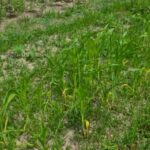North Georgia vegetable gardening has a rich tradition that dates back for generations, with the region’s unique climate and soil providing both opportunities and challenges for those looking to cultivate their own produce. From the Appalachian foothills to the rolling farmland, North Georgia offers a diverse landscape for gardening enthusiasts to explore.
Whether you’re a seasoned gardener or just starting out, understanding the specific conditions of North Georgia is essential for success. In this article, we will delve into the intricacies of North Georgia vegetable gardening, from selecting the right vegetables to dealing with pests and diseases, and connecting with the local gardening community.
The climate and soil of North Georgia present distinctive growing conditions that shape the types of vegetables that thrive in the region. By gaining an understanding of these factors, gardeners can make informed decisions about what to plant and how to care for their crops. From the mountainous terrain to the river valleys, each area within North Georgia offers its own set of challenges and opportunities for vegetable gardening.
As we delve further into this article, we will provide a comprehensive guide to choosing the right vegetables for North Georgia, offer tips for planning and preparing your garden, as well as best practices for planting and caring for your vegetables. Additionally, we will address common challenges such as pests and diseases unique to North Georgia and provide insights on how to overcome them.
Whether you are a novice or experienced gardener in North Georgia, this article aims to equip you with the knowledge and resources needed for successful vegetable gardening in this vibrant region.
The Climate and Soil of North Georgia
One of the key factors to consider when gardening in North Georgia is the region’s moderate climate. With hot, humid summers and mild winters, gardeners must select vegetables that can withstand both extremes. Some vegetables that thrive in North Georgia’s climate include tomatoes, cucumbers, squash, and peppers. On the other hand, cold-sensitive plants like tropical fruit trees may struggle to survive in this region.
In addition to the climate, the soil composition in North Georgia also influences which vegetables are best suited for cultivation. The region’s soil is typically acidic with a high clay content, making it important for gardeners to amend the soil to achieve optimal pH levels and improve drainage. Furthermore, understanding the specific nutrient needs of plants and how to address deficiencies in North Georgia’s soil will contribute significantly to a successful vegetable garden.
When planning your garden in North Georgia, it’s essential to choose vegetables that not only align with the region’s climate but also thrive in its particular soil conditions. To help you select the right vegetables for your garden, here are some options that are well-suited for North Georgia:
- Tomatoes
- Cucumbers
- Squash
- Peppers
- Green beans
- Collard greens
By understanding how the climate and soil impact vegetable growth in North Georgia, you can make informed decisions about what to plant and create an environment where your garden will flourish.
Choosing Vegetables That Thrive in North Georgia
When selecting vegetables for your North Georgia garden, it’s important to prioritize varieties that are well-adapted to the regional climate and growing conditions. Here are some recommendations:
- Consider planting heat-tolerant tomato varieties such as “Celebrity” or “Sun Gold.” These cultivars have been shown to perform well in North Georgia’s hot summer temperatures.
- Opt for cucumber varieties like “Marketmore” or “Straight Eight,” which are known for their resistance to common cucumber diseases prevalent in this region.
- Select squash types such as “Zephyr” or “Yellow Crookneck” that exhibit good heat tolerance and resistance against powdery mildew.
By choosing vegetables that are well-suited to North Georgia’s unique growing conditions, you’re setting yourself up for a successful and fruitful harvest.
Choosing the Right Vegetables for North Georgia
When it comes to North Georgia vegetable gardening, selecting the right vegetables for the region’s unique climate and soil is crucial for a successful and bountiful harvest. Fortunately, there are plenty of options that thrive in this area, allowing gardeners to enjoy a diverse range of crops throughout the growing season. Here’s a guide to some of the best vegetables to consider for your North Georgia garden:
- Tomatoes: With proper care and attention, tomatoes can flourish in North Georgia’s warm summers and well-drained soil.
- Zucchini: This versatile and prolific summer squash thrives in the warm temperatures and ample sunlight of North Georgia.
- Collard Greens: A staple in Southern cuisine, collard greens are well-suited to the climate and soil of North Georgia, making them an excellent choice for home gardens.
- Green Beans: Both bush and pole varieties of green beans do well in North Georgia’s growing conditions, providing a reliable and abundant crop for gardeners.
In addition to these popular choices, other vegetables that tend to thrive in North Georgia include peppers, cucumbers, okra, and various types of herbs. When selecting your vegetable crops, be sure to consider factors such as sunlight requirements, water needs, and potential pest or disease resistance specific to this region.
By choosing the right vegetables suited for North Georgia’s climate and soil, you can set yourself up for a successful growing season with a variety of nutritious and delicious produce to enjoy. Whether you’re a seasoned gardener or just starting out, exploring the options available for this region can lead to an abundant and rewarding harvest.
Planning and Preparing Your Garden
When it comes to planning and preparing your vegetable garden in North Georgia, there are several factors to consider in order to ensure success. The unique climate and soil conditions of the region require careful planning and thoughtful preparation to create a thriving garden. From selecting the right location for your garden to preparing the soil and choosing the best vegetables for the region, proper planning is essential for a bountiful harvest.
Selecting the Right Location
The first step in planning your North Georgia vegetable garden is choosing the right location. Look for a spot that receives plenty of sunlight, as most vegetable plants require at least 6-8 hours of direct sunlight each day. It’s also important to consider water accessibility and drainage when selecting a site for your garden. Avoid areas that are prone to flooding and choose a location with good soil drainage to prevent waterlogged roots.
Preparing the Soil
The soil in North Georgia can vary, but generally consists of clay or loamy clay with a slightly acidic pH. Before planting, it’s important to prepare the soil by tilling it to loosen compacted areas and incorporating organic matter, such as compost or well-rotted manure, to improve soil structure and fertility. Adding organic matter will also help with moisture retention and nutrient availability, creating an optimal growing environment for your vegetables.
Choosing the Right Vegetables
It’s crucial to select vegetables that are well-suited to the climate and growing conditions of North Georgia. Some popular options include tomatoes, peppers, squash, cucumbers, beans, and various leafy greens like lettuce, kale, and spinach.
These vegetables tend to thrive in the warm summers and mild winters of North Georgia, making them ideal choices for your garden. By carefully considering these factors when planning and preparing your garden, you can set yourself up for success in growing healthy and abundant crops in North Georgia.
Planting and Caring for Your Vegetables
North Georgia offers a unique and rewarding environment for vegetable gardening. With its rich soil and diverse climate, this region is home to a wide variety of vegetables that thrive in the local conditions. When it comes to planting and caring for your vegetables in North Georgia, there are several best practices to keep in mind to ensure a bountiful harvest.
One of the first steps in planting your vegetable garden in North Georgia is to consider the timing of your crops. The region experiences four distinct seasons, so it’s important to plan your planting schedule accordingly.
Some vegetables, like tomatoes and peppers, can be started indoors early in the year and then transplanted outside once the risk of frost has passed. Others, such as lettuce and spinach, can be directly sown into the ground as soon as the soil is workable.
In addition to timing, it’s crucial to select vegetable varieties that are well-suited to the specific conditions of North Georgia. Certain crops, like okra and sweet potatoes, are particularly well-adapted to the long, hot summers of the region. On the other hand, cooler weather vegetables such as broccoli and kale thrive during the mild winters. By choosing the right vegetables for North Georgia, you can set yourself up for success and a plentiful harvest.
| Vegetable | Best Planting Time |
|---|---|
| Tomatoes | Early Spring |
| Lettuce | Early Spring/Fall |
| Broccoli | Fall/Winter |
| Okra | Spring/Summer |
Dealing With Pests and Diseases
Identifying Common Pests and Diseases
One of the key challenges for North Georgia vegetable gardening is the presence of pests and diseases that can threaten the health of your plants. Some common pests to watch out for include aphids, caterpillars, and squash bugs, while diseases such as powdery mildew and blossom end rot can also affect your garden. It’s important to be able to recognize the symptoms of these issues early on so that you can take action to prevent them from spreading.
Natural Pest Control Methods
In North Georgia, many gardeners prefer to use natural pest control methods to protect their vegetables from harm. This may include introducing beneficial insects like ladybugs or lacewings to help keep pest populations in check, as well as planting companion crops that repel certain insects. Additionally, using organic insecticidal soaps or neem oil can effectively control pests without harming the environment or beneficial insects.
Disease Prevention and Management
Preventing diseases in your North Georgia vegetable garden involves several key practices, such as crop rotation and proper spacing between plants to improve air circulation. Choosing disease-resistant varieties of vegetables can also help reduce the likelihood of infections taking hold.
If you do encounter a disease outbreak, it’s important to promptly remove and dispose of affected plant material to prevent further spread. Implementing good gardening practices, such as avoiding overhead watering and keeping weeds under control, can also contribute to disease management in your garden.
By understanding the common challenges posed by pests and diseases in North Georgia vegetable gardening and implementing effective strategies for prevention and control, you can maintain a healthy and thriving garden throughout the growing season.
Harvesting and Maintaining Your Garden
As the gardening season progresses, it’s important to stay on top of harvesting and maintaining your North Georgia vegetable garden to ensure long-term success and enjoyment. Knowing when and how to harvest your crops, as well as properly maintaining your garden, are essential for a bountiful harvest and a thriving garden.
When it comes to harvesting your vegetables in North Georgia, timing is key. Many vegetables have specific cues that indicate they are ready to be harvested. For example, tomatoes should be harvested when they have reached full color and firmness, while carrots are ready when their tops have reached about 1 inch in diameter. Be sure to research the specific harvesting guidelines for each type of vegetable you are growing in your North Georgia garden.
In addition to harvesting, maintaining your garden is crucial for its long-term success. Regular weeding, watering, and fertilizing are all important tasks that help keep your plants healthy and productive.
It’s also important to monitor for any signs of pests or diseases, as addressing these issues early can prevent them from spreading and damaging your crops. By staying on top of maintenance tasks, you can ensure that your North Georgia vegetable garden continues to thrive throughout the growing season.
| Vegetable | Harvesting Guidelines |
|---|---|
| Tomatoes | Harvest when fully colored and firm |
| Carrots | Ready when tops are about 1 inch in diameter |
Connecting With the North Georgia Gardening Community
In conclusion, North Georgia offers a rich tradition of vegetable gardening, with its unique climate and soil providing both challenges and opportunities for gardeners in the region. By understanding the specific growing conditions and choosing the right vegetables for this area, individuals can set themselves up for success in their gardening endeavors.
Planning, preparing, planting, and caring for a North Georgia vegetable garden require attention to detail and knowledge of best practices, but the rewards of a bountiful harvest are well worth the effort.
As with any form of gardening, dealing with pests and diseases is a common challenge in North Georgia. However, by staying proactive and informed about potential issues, gardeners can overcome these challenges and maintain healthy plants. Harvesting and maintaining a garden in this region also require ongoing care and attention, but the satisfaction of enjoying homegrown produce makes it all worthwhile.
For those interested in North Georgia vegetable gardening, connecting with the gardening community can provide valuable resources, support, and opportunities for sharing knowledge. Whether through local events or online forums, engaging with other vegetable gardeners in the region can offer helpful advice as well as a sense of camaraderie in this fulfilling pursuit. With the right approach and commitment, vegetable gardening in North Georgia can be a rewarding and enriching experience for individuals seeking to cultivate their own produce.
Frequently Asked Questions
Which Region of Georgia Would Be Best Suited for Growing Vegetables?
The region of Georgia best suited for growing vegetables would be the northern part of the state, where the climate is cooler and more suitable for vegetable crops. Areas like the Appalachian foothills have fertile soil and good conditions for growing a variety of vegetables.
How Do You Prepare Georgia Soil for Gardening?
To prepare Georgia soil for gardening, it is important to start by testing the soil to determine its pH level and nutrient content. Based on the results, you can add organic matter such as compost or well-rotted manure to improve soil structure and fertility.
It’s also crucial to till the soil to break up any compacted areas and create a good seedbed for planting.
What Vegetables Grow Well in a North Facing Garden?
In a north facing garden in Georgia, certain vegetables thrive due to the limited sunlight exposure. Leafy greens like kale, spinach, and lettuce are excellent choices, as they can tolerate partial shade and cooler temperatures. Other options may include broccoli, cauliflower, and cabbage which can also do well in these conditions.

If you’re looking to get into vegetable gardening, or are just looking for some tips on how to make your current garden better, then you’ve come to the right place! My name is Ethel and I have been gardening for years. In this blog, I’m going to share with you some of my best tips on how to create a successful vegetable garden.





